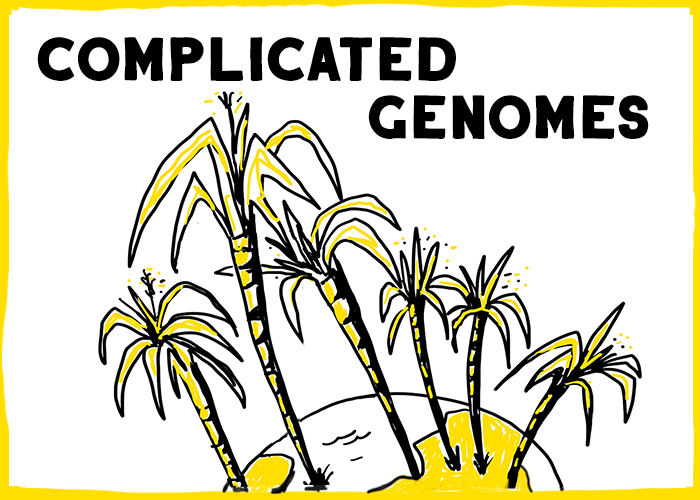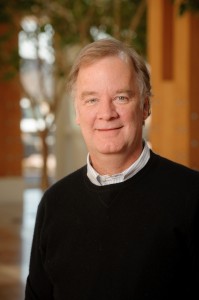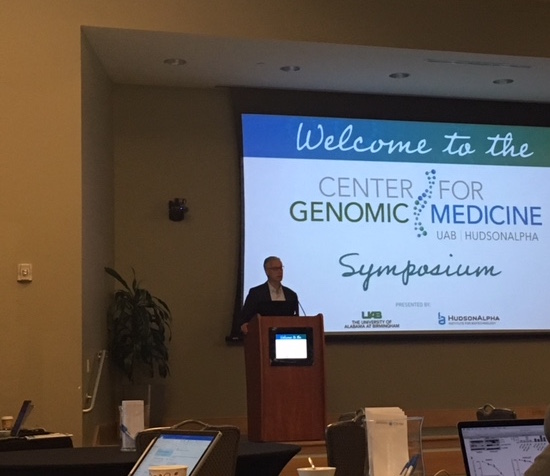Komen funds collaborative effort using tumor genomics to identify effective treatments
HUNTSVILLE, Ala. – The most commonly diagnosed form of breast cancer, termed estrogen receptor positive or ER+, accounts for the largest percentage of breast cancer deaths each year. Research by scientists at the HudsonAlpha Institute for Biotechnology and the University of Alabama at Birmingham Comprehensive Cancer Center aims to provide physicians a more targeted approach to treating ER+ breast cancer.
“Can we find something in the genome that correlates with those patients who respond to treatment as opposed to those who do not?” posed Rick Myers, Ph.D., president and director of HudsonAlpha. Myers, principal investigator on the nearly $1 million grant recently awarded by Susan G. Komen for the Cure, said researchers have an unprecedented opportunity to identify molecular signatures that could mean faster, more effective treatments.
Myers, along with Katherine Varley, Ph.D., at HudsonAlpha, and Andres Forero, M.D., and Don Buchsbaum, Ph.D., of the UAB Comprehensive Cancer Center, will evaluate the genetic composition of breast cancer cells obtained from an investigator initiated trial that combined two medications; one that blocks estrogen action and the other a monoclonal antibody that blocks formation of vessels in the tumors. The patients with ER+ breast cancer participating in the trial provided biopsy specimens from primary tumors prior to treatment and at six weeks after the initiation of therapy. Physicians and scientists at UAB, including Forero and Buchsbaum, led the clinical trial.
“The trial involved a unique combination of drugs,” said Myers, “and some women responded well to the treatment and others did not. With this Komen award, we will use new technologies to examine all the genes – the entire genomes – in the tumor tissues from the women who participated, in hopes of identifying molecular signatures specific for those who respond versus those who do not respond.” Physicians could then use these signatures, or biomarkers, to test women with ER+ breast cancer prior to treatment, and then use this particular combination therapy for those women with the appropriate signature.
“We’re also looking at the genomic data for ways to monitor patients,” said Myers.
Myers and Forero explained that some patients respond favorably to the combination therapy initially but acquire a resistance over the course of treatment. “We want to catch a tumor before it starts growing again and optimally see that a patient continues a favorable progression.”
In regard to patients who didn’t respond well to the combination treatment in the clinical trial, Myers said those signatures might point to alternative treatment strategies.
“Funding from Komen for the Cure will allow us to carry this research full circle,” said Forero, a professor of hematology and oncology at UAB. “From the original clinical trials conducted at UAB, to the genomic analysis at Hudson Alpha and back to another round of clinical investigation, this research should provide valuable insight that will allow us to tailor treatments for ER+ in the most effective way.”
Media Contact: Beth Pugh
bpugh@hudsonalpha.org
256-327-0443
About HudsonAlpha: HudsonAlpha Institute for Biotechnology is a nonprofit institute dedicated to innovating in the field of genomic technology and sciences across a spectrum of biological problems. Its mission is three-fold: sparking scientific discoveries that can impact human health and well-being; fostering biotech entrepreneurship; and encouraging the creation of a genomics-literate workforce and society. The HudsonAlpha biotechnology campus consists of 152 acres nestled within Cummings Research Park, the nation’s second largest research park. Designed to be a hothouse of biotech economic development, HudsonAlpha’s state-of-the-art facilities co-locate scientific researchers with entrepreneurs and educators. The relationships formed on the HudsonAlpha campus allow serendipity to yield results in medicine and agriculture. Since opening in 2008, HudsonAlpha, under the leadership of Dr. Richard M. Myers, a key collaborator on the Human Genome Project, has built a name for itself in genetics and genomics research and biotech education, and boasts 26 biotech companies on campus.




